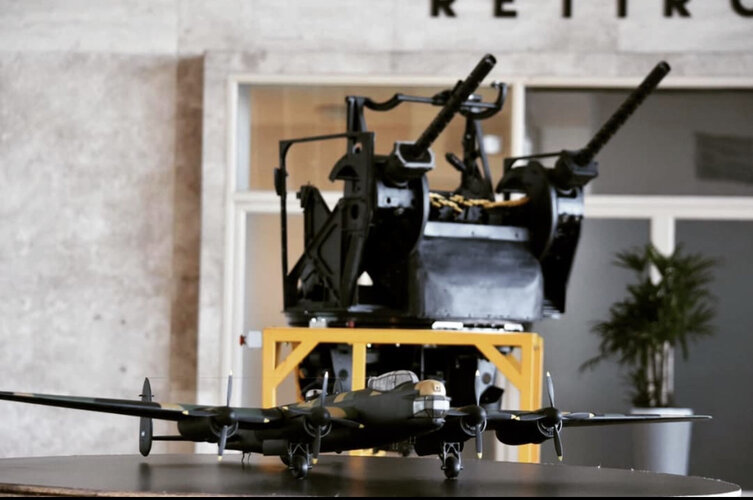I think Calum makes some excellent points, perhaps a bit too pessimistic but things do generally seem to be a terminal decline.
For years there has been dumbing down and politicisation to "get kids involved" and pander to various fashionable viewpoints -
Coupled with the "politicisation" of the past in the minds of younger people could we be seeing a long term trend to replace real objects with "virtual experiences".
Child friendly displays have been with us for many years, I remember the FAA Museum at Yeovilton installed a 'hands-on' display of how aircraft fly and design features back in the late 1990s and I was quite impressed with its quality (explaining how fabric coverings alter when doped etc.). Cosford has a similar thing (tucked behind the Bristol 188 ironically...) that has more of a fairground toy effect than being seriously educational, the Tank Museum at Bovington has a series of really good features for kids too. Hendon has some nice touches, the WW1 hangar showing how wooden propellers were made is interesting for grown ups too!
And actually when you think about it children probably make up a large slice of visitors, whenever I go to Hendon I'm struck how many mothers are idly wheeling prams or walking small kids as a free place to roam about (maybe aircraft will seep into their subconscious?). I don't think I have ever been to any larger museum in the UK on a weekday without getting tangled up in a school trip.
But good displays can seperate the 'kid' and 'adult' content but I don't think it should dumb down. The obession with 'hands on' is also worrying, this is the list of Hangar 1 'hands on' stuff at Hendon:
- Try on an RAF uniform
- Sensory areas include tactile models of aircraft and other objects, iconic RAF smells and sounds
- Could you have been a Women’s Royal Air Force Plotter? Set plots on an interactive Second World War operations room table
- Explore Sir Frank Whittle’s innovative Power Jets engine on an interactive screen
- Test yourself: test your reaction timing; test your multi-tasking skills; work together on an engineering challenge
- Learn how to fly a Gnat in a simulator
- Take the pilot’s seat in our Simulator Zone (£)
- Fix a Sea King (under 5s experience): refuel, fix bolts and turn propellers
- Sit in a miniature plane (under 5s experience): DH9A, Spitfire, Gnat and Sea King.
Erm, cool any chance of seeing any aircraft? There are just 5 in this 'hangar' (DH.9A, Spitfire and Gnat hanging up, Sea King on the floor and the Sunderland all on its own and that bloody plastic F-35....)
Saying that, how many people truly care about what is being displayed? About 20 years ago I was struck by how many families saw Duxford as an (expensive) picnic location with no interest in the aircraft at all. How many people wander aimlessly in front of the Elgin Marbles or a Lancaster for a selfie opportunity? You can usually tell the die-hard nerds, they roam about draped in camera equipment and start peering up access hatches but they usually stand out because they are so rare!
2) Covid has probably irrecoverably damaged many, due to obvious restrictions on visitors.
This will go away with time but I do think that pre-booking may come to stay as a way to manage parking and resources.
But saying that, my 'local' air museum (Solway Aviation Museum, Carlisle) used those 18 months to really revamp the whole site and repaint all the aircraft to really give the place a huge boost.
3) Old planes are getting more and more expensive to run, there are less and less people (by which I mean young people) able to work on them, and health and safety regs only get tighter. I`m certain that in the UK, it will be impossible for anyone other than the
BBMF (or similar) to fly at displays within 15years.
That is very pessimistic. There seems to be more young blood in the restoration industry than we often give credit for. Yes I think the sector will shrink and deep pockets will be needed.
I would say privately-owned jet displays will soon be extinct, already they have dropped off (even before Shoreham), there are just too many pitfalls and technical challenges with parts and expertise and fuel costs.
My greatest worry actually is SSAC flights - the temptation to make every new warbird project a two-seater cash cow is getting greater, even stock Spits are being altered to 2-seaters. If SSAC spreads to larger types it might spread the load but then some idiot is bound to get hold of B-25 or something and cut a load of windows into it. Yes its keeping planes flying, pilots current, injecting cash and keeping the engineering side ticking along but in 20 years they might be the only players in the market with fleets of 50-60 2-seat warbirds and everything else seen as unprofitable museum pieces.
I think they will probably mostly close, and the planes etc will be sold off to collectors.
Personally I do not think 90% of museums have anyone on their payroll either interested in, or capable of actioning #2
The diabolically shameful actions of two major UK museums/archives in recent years are sad testimony to this.
In terms of archives I think all that can be done, is for private individuals to form "clubs" or groups whatever you want to call it, and pool their archive collections. For planes, I dont know.. they`re not digitisable (well, not REALLY), or distributable.
I think this is a big danger. Firstly a lot of the expertise in archives are volunteers who often worked at the companies whose artefacts are in the archives. These guys are aging, when they go then their expertise and insight goes and so does the drive to keep the archives open. Companies don't really want to keep old paper laying around from predecessor companies and for museums they have tons of stuff already (last year's TV series at Brooklands comes to mind, the upper level of the Clubhouse being boxes and boxes of unopened stuff), more stuff than they know what do with.
Digitisation takes time and money, most archives are still cataloguing and making sense of what they have, let alone having the time to set up online file stores and start scanning thousands of documents. Plus who knows what file types might still be accessible in 20 years time? How do you safely backup all that material for long periods of time?
The Aviation and Aerospace Archives Initiative is a welcome boost but its a massive task and whether it can make any real impact is open to question. But its good that thought is going into this area now before it gets too critically late.
Air Britain is attempting to look at ways to increase access to its archive of material but seem moribund as membership declines and efforts to attract new (younger) members seem fruitless.
I would add another factor. The heritage industry is an industry, a career pathway. A lot of curators and managers are curators and managers, whether its a museum of teapots, aircraft or diecast toys. There does seem to be a lack of empathy or deep understanding of the collections they are looking after.
So we end up with grand projects, stuff like Hendon's Hangar 1 full of small artefacts and low lighting which has tons of open space. Then we get into "relevance" and "atmosphere" so that perfectly good stuff is disposed of, owners of aircraft have been suggested to "leave" IWM Duxford and seek hangarage elsewhere if their aircraft don't 'fit' the narrow WW2 warbird ethos, even Flying Legends was deemed not relevant enough!
And then we have the government poking its nose in and threatening publicly-funded museums in its odd "culture war" if they do anything that might be considered too 'woke' (money spent on hands-on kid's exhibits for 5-year olds = good, money spent on surveys of how many National Trust properties were owned by slave owners = bad)
Thankfully smaller museums are just getting on with the job in hand and free of consultants and 'heritage' experts they do the best with what resources they have on hand.
The Imperial War Museum? Holy frijoles, you can see the protests based on just the name alone.
Oddly enough it doesn't seem to be a problem (so far), its probably the only public institution that has gotten away with using the Imperial tag. Presumably it hopes nobody will try to figure out what IWM stands for?



